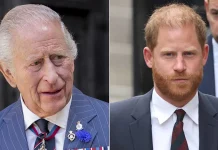Headlines matter a lot; and the one BBC News Online put on its report last week about a Jew-hunting mob at an airport in Dagestan amazed me. It read: ‘Anti-Israel mob storms Dagestan airport in Russia.’
But the mob did not specify ‘Israel’ as their target. As the news story below the headline reported, one passenger ‘said he was let go after rioters told him: ‘We are not touching non-Jews today’.
In fact, there is a small, ancient Jewish community in Dagestan, some of whom could have been on that plane that had just landed at Makhachkala Airport. If so, they, too, would have felt at mortal risk from the rioters.
Online newspaper reports coming out at the same time as the BBC’s all had headlines referring to this as a hunt for ‘Jews’. So why couldn’t those in the BBC’s newsroom responsible for its headline – over a story which itself made clear this was an anti-Semitic riot — bring themselves to call this what it was?
A few hours after the story was put up, the headline changed to ‘Dagestan: Mob storms Russian airport in search of Jews’. I gather the BBC switchboard had been buzzing with people making a similar point to mine, and a decision was taken to change the headline (although you will find no acknowledgment that the original version said something quite different).
Still, the BBC moved quickly on this occasion — which is highly unusual. Take the way it dragged its editorial feet when confronted with evidence it had falsely blamed a group of Jewish teenagers for making anti-Muslim remarks, when they were themselves the true victims of a deeply unpleasant encounter in Oxford Street, London, a couple of years ago.
Film taken by the students — who were in a hired bus for a trip celebrating the first day of the Jewish festival of Hanukkah — showed a group of men spitting, making Nazi salutes, hurling abuse, and banging on the vehicle’s windows.
As soon as the footage emerged, the then Prime Minister, Boris Johnson, responded, on Twitter (now X): ‘Racism of any kind will never be tolerated in our society.’
Yet when the BBC then produced its own report, it claimed that the teenagers inside the bus had made ‘slurs about Muslims’. As if, somehow, this was six of one and half a dozen of the other.
I discovered that this allegation of ‘anti-Muslim’ slurs was not in the story submitted by the reporter involved, but came from within the BBC’s newsroom. It was unsubstantiated, and evidence later emerged that what the BBC claimed to be ‘Muslim slurs’ (in English) was actually one of the teenagers saying in Hebrew: ‘Call someone, it’s urgent.’












